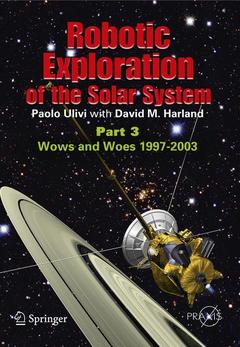Description
Robotic Exploration of the Solar System, 2012
Part 3: Wows and Woes, 1997-2003
Space Exploration Series
Authors: Ulivi Paolo, Harland David M.
Language: English
Subjects for Robotic Exploration of the Solar System:
Keywords
Cassini; Mars; Saturn; Space Age; space probes; spacecraft; unmanned
529 p. · 16.8x24 cm · Paperback
Description
/li>Contents
/li>Biography
/li>Comment
/li>
Paolo Ulivi and David Harland provide in Robotic Exploration of the Solar System a detailed history of unmanned missions of exploration of our Solar System. The subject is treated from an engineering and scientific standpoint. Technical descriptions of the spacecraft, of their mission designs and of instrumentations are provided. Scientific results are discussed in considerable depth, together with details of mission management.
The project will deliver four volumes totaling over 2,000 pages that will provide comprehensive coverage of the topic with thousands of references to the professional literature that should make it the 'first port of call' for people seeking information on the topic. The books will cover missions from the 1950s until the present day, and some of the latest missions and their results will appear in a popular science book for the first time.
(In Part 1) Introduction.- Chapter 1: The beginning.- Chapter 2: Of landers and orbiters.- Chapter 3: The grandest tour.- (In Part 2) Chapter 4: The decade of Halley.- Chapter 5: The era of flagships.- Chapter 6: Faster, cheaper, better.- (Now in Part 3) Foreword.- Author's Preface.- Acknowledgments.- Chapter 7: The last flagship.- Chapter 8: Faster, cheaper, better continues.- Chapter 9: Mars invaded.- Glossary.- Appendices.- Chapter references.- Further reading.- Previous volumes in this series.- Index.
Paolo Ulivi was born in Florence, Italy and graduated from the Politecnico di Milano University with a thesis on robotics for Mars sample return missions. He works as a consultant in aerospace structures in Toulouse, France. In his free time, he researches the history of astronautics, astronomy, aeronautics and the Cold War. He is also an amateur astronomer and specializes in Solar System observations.
David Harland studied astronomy to degree level, and pursued a career lecturing in computer science, and academic and industrial research. In 1995, David "retired" to resume his interest in spaec and started to write. He has over two dozen books published to date, a majority of them with Springer/Praxis and several others under contract. These days he considers himself to be an amateur hermit and a professional space historian.




